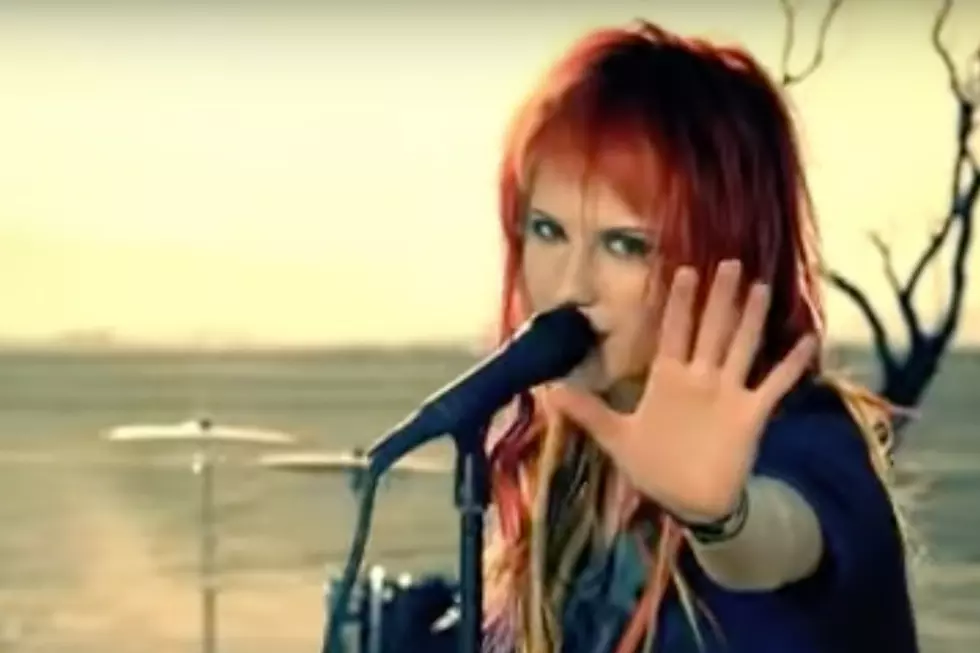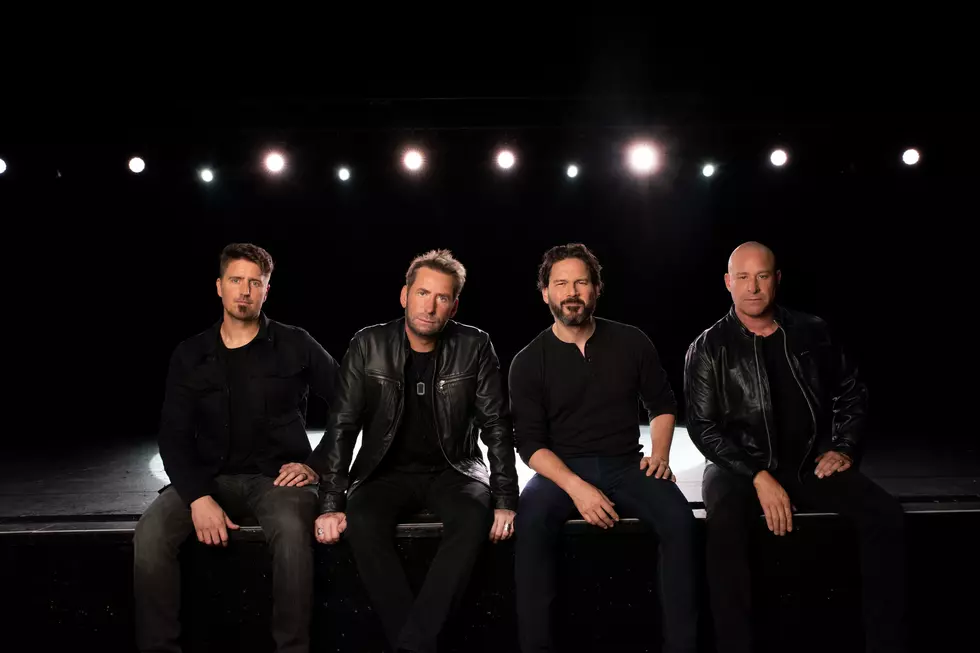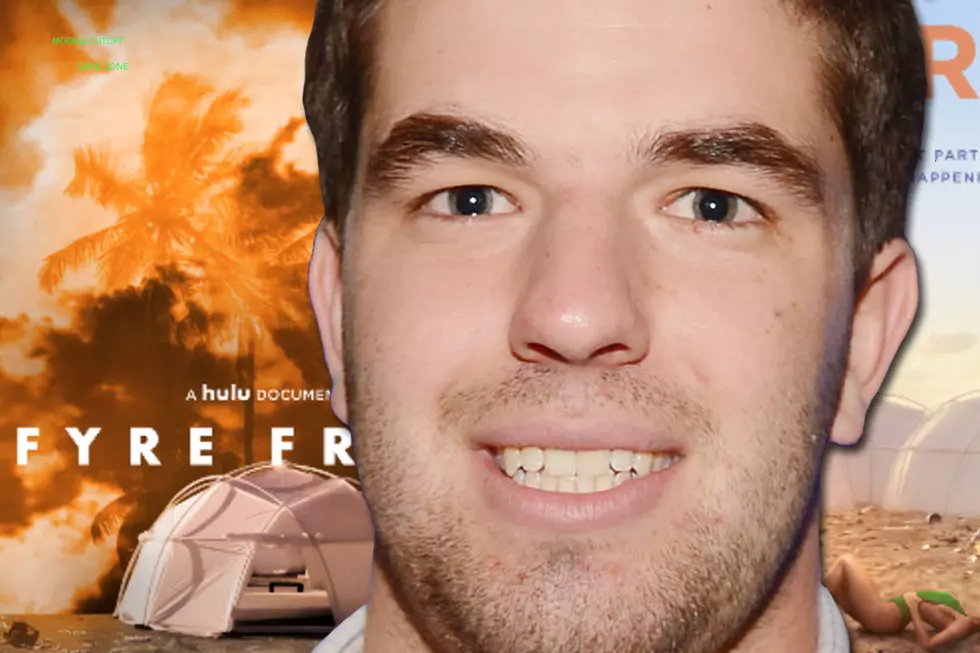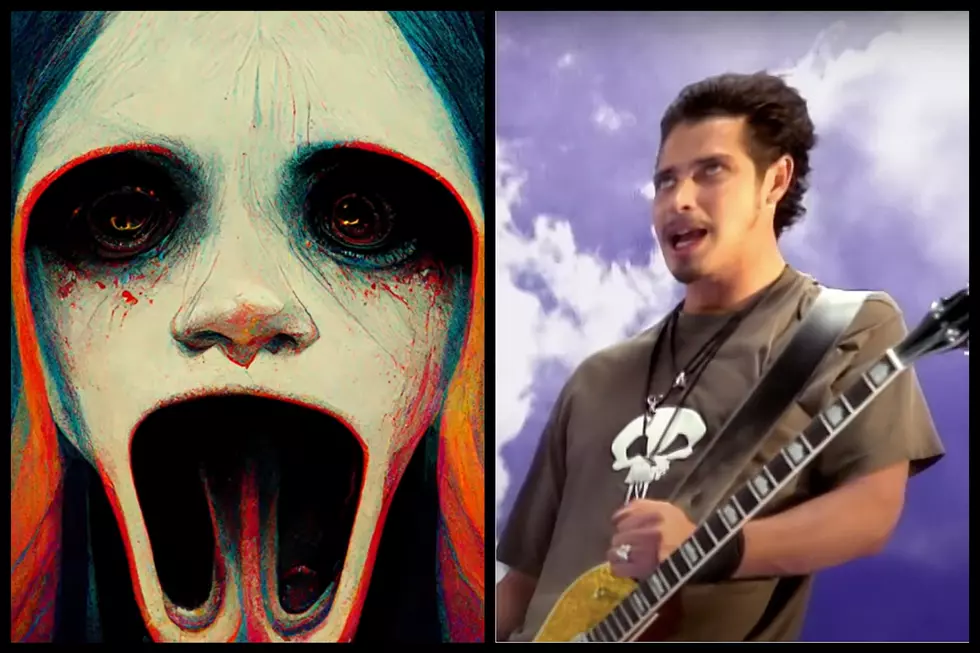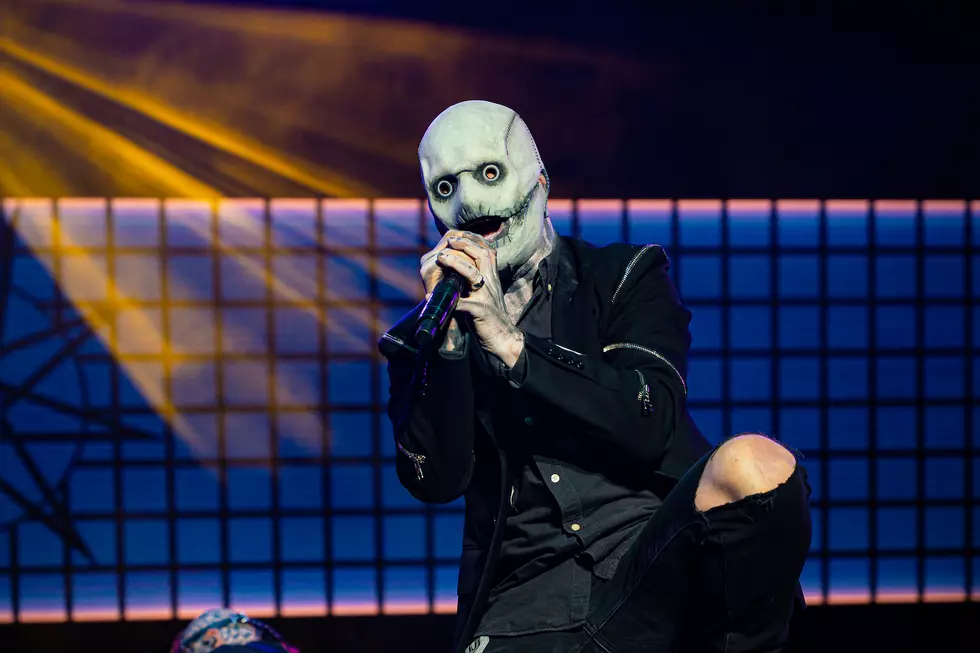
David Ellefson: New Megadeth Album Could Be Out in 2019
David Ellefson was the latest guest on Full Metal Jackie's weekend radio program. The bassist discussed his experience narrating the Inside Metal: Rise of L.A. Thrash Metal documentary, moving from Minnesota to Los Angeles where he met Dave Mustaine, the success of Dystopia and what's on the horizon for Megadeth. Check out the chat below.
You have a lot going on in your world.
I do. I'm blessed to be busy, I always remind myself that I get to do these things because otherwise if you look at it with the glass half empty you go, "Oh my god! My plate is so full!" [laughs] I cant believe all the stuff I have to do. Yeah, it's a wonderful thing. For all of us that have grown up in this business and industry and have watched it changed as much as it has, the fact that we still get to be in it, something we like with people we like and with our fans, we are truly blessed.
Let's talk about the new Inside Metal: The Rise of L.A. Thrash Metal documentary. It's about an important place and time in your life. Looking back, what was that scene like for you being a young kid from Minnesota?
I grew up on a farm in Minnesota. It was around 1981-ish, I think — I was rehearsing with my band in a farm building, like a grain building, and it was like a Saturday afternoon and the thought just hit me, I've got to get to LA. Out of nowhere this thought came to me. And, honestly, I just followed that thread.
I was ready to go tell my parents I'm quitting school, I'm going to L.A. tomorrow. Which I think I did, actually. And I think they laughed. They said, yeah, you're getting your high school education. But literally two years later when I graduated in 1983 I had made the plan, and fortunately my parents supported me, you know, they helped me get out to L.A. with a little bit of money and the family van and a little credit card. The credit card which would later go on to finance the Killing Is My Business tour.
But when I got there, I mean talk about 180 degree turn from where I grew up in Minnesota. But, you know, I had noticed leading up to that and I think part of what the instinct I had on it is certainly Van Halen had come from the West Coast and had blown up to become a big band. Now Ozzy Osbourne was getting his musicians out of L.A., with Randy Rhoads, Rudy Sarzo. And by the time I got there Quiet Riot was No. 1 on the carts and all over MTV. And Motley Crue had just played the US Festival.
So all of these huge shifts were happening in Los Angeles. And when I got there, within a week, as a lot of people know the story, my upstairs neighbor was Dave Mustaine, who was recently formerly of Metallica. And I had not heard of Metallica before, being in the Midwest; news travelled very slowly, usually by way of Circus Magazine, Hit Parader Magazine, you now, a lot of the big print magazines.
So, I met Dave and got to know him and started talking and there was this whole other scene that was starting and certainly he was there on the downbeat of that, with Metallica. And, you know, it was interesting because as we talked about music, you know, I knew some of the bigger, more mainstream bands, Def Leppard, Iron Maiden, a lot of these new wave British heavy metal groups. But then there was this second wave of Diamond Head, Motorhead, Tygers of Pan Tang, Tank, you know, all this kind of stuff that was coming over from Europe.
And that really was kind of the real underground of that scene that inspired what would become the thrash scene. And this movie speaks to the importance of Los Angeles and how many great musicians and bands came out of Los Angeles. Even though L.A. never really got the credit for its contribution to thrash.
What's the most surreal thing about narrating a documentary that's about your peers, friends and yourself?
I think what's so weird about it is they send you the script, because, you know Bob Nalbandian, who has been a long time friend, and in fact was one of the first people I met when I got to Los Angeles, through Dave, because he really was just really there as a fan. So when he tapped all of us to participate in this film a lot of the segments had been filmed and then he sent me the script, which I did at the studio here in Scottsdale, Arizona, where I live. So, of course I knew the storyline but, you know, seriously, how my narration fits in with all of cuts of people like, even myself being interviewed in the film, you know Lars and Juan Garcia who is the guitar player in Body Count.
So yeah, it's kind of interesting to say, Yeah Metallica and Megadeth, you know, speaking about my own band, Megadeth, in the film, you know, using my best James Earl Jones, and narrating film.
But, you know, it was kind of educational, actually, even doing a narration, because you learn things about - it's kind of like making a record, you learn more about your buddies in the band as you're working with them in the studio and I think the same thing happened with the narration process.
Being a founding member of Megadeth you were right in the middle of the trash scene. What came as a surprise to you, something you never knew until you narrated The Rise of L.A. Thrash Metal documentary?
You know, probably there was was a handful of different people that were there. I knew of Brian Slagel of Metal Blade, I knew of his importance. In fact, he was kind of the guy in Los Angeles. Johnny Z with Megaforce was on the east coast and of course Combat Records who Megadeth would later sign with, the east coast label. I knew a lot of the people. Kate from Hi Racks, I knew of Armored Saint of course. They aren't really a thrash band but they were kind of friends of the trash scene. I think probably what was - the most educational thing I saw watching the film was Marty Friedman's explanation of it.
And I knew a lot of it, because I had played in the band with him for 10 years, we had many conversations about this, but just to sit back as a viewer of the film and watch him detail him living in Hawaii, forming Hawaii and referencing a lot of the jazz musicians who were getting the notoriety for being sort of the very astute and progressive musicians.
Yet him talking about how this thrash scene was raising up this whole generation of very, very capable and terrifically talented guitar players and musicians. So I'd say that was one of them. Maybe narrating probably just remembering the dichotomy of Los Angeles and San Francisco having Metallica and Death Angel, Testament, Exodus. Even though Metallica originally hailed out of Los Angeles, which I knew, but it hit me just how the scene was so divided between Los Angeles and San Francisco. I don’t know if it was as much of a revelation as it was a reminder of that.
Let's talk about the last Megadeth album, Dystopia, a very successful album for Megadeth. Does that create a feeling of momentum that will continue into the next album?
Yeah, for sure. In fact, as we were discussing the next album, album 16 I guess if you will. Studio album 16. We talked about - and Dave and I certainly have these reference points of when the band started to become successful in the mainstream back in the '90s and how metal music by and large kind of went away, at least thrash music. It was replaced by certainly by Seattle music and nu-metal and different things, different genres. How it was very tricky waters to navigate and we resolved, made some adjustments and made some changes in and around that and some worked and quite honestly some didn't. Some took - they've taken us 15 almost 17 or 18 years to overcome some of those obstacles and I think we've finally overcame those with Dystopia.
Dave, all these years later you've grown and matured from that kid who formed Megadeth with Dave Mustaine. What never changed and always stayed the same?
Right before we had this phone call I had my bass on and I'm learning songs. I'm playing and sometimes life can get busy and take me away from the bass. Sometimes a little longer than I wished it did and those are the challenges as a musician to be careful of - that you don't get so busy in life that life takes you away from the very thing that gave you your life. I'm just playing and I'm just jamming along to some tunes and learning some things it just - I swear Jackie, I feel like I'm that little 11 or 12-year-old kid again learning how to play the bass all over. That guy that goes, "Man, I've got to call some of my buddies in the neighborhood and we've got to get a band and start a band!" I think that's the thing - I carried that through my teenage years in Minnesota.
That spirit kept with me moving out to L.A. when I met Dave, we had that same spirit together of - we need to find some guys that think like us, play like us and want to share the same vision of what we do. I think that also becomes the challenge of keeping the band together because as people grow and get involved in their own lives, trying to keep that core nucleus of, "Why did we start doing that in the first place?" I think that, probably for Dave and I, is the thing that we've shared because we were there from the beginning. To be able to share that together is probably the thing that hear now as we turn the corner to 2018 keeps us excited and keeps that momentum moving forward now through the new year and into the next album.
Dave, tell us what's to come this year with Megadeth.
We have a pretty full robust summer of festivals over in Europe. Its funny, because we're at this phase in our career right now where normally we'd sort of come off a big tour like Dystopia for two years and shut down. We'd take a year to go in and make a record and then we'd put that new record out and go out and tour for another year or two behind that but now I think where music is because live music is such an important and critical part of just what we do as a band and in our industry. Now the phone rings all the time. [laughs] "Hey we got an offer, is Megadeth available?" So now our mindset is more of - certainly a focus on writing some new material but I've watched over the - and I think it kind of started when we did, in 2010, our first anniversary tour which was the 20th anniversary of Rust in Peace.
I saw in the front row there were literally teenagers there who had just bought their Megadeth shirts and probably were able to buy Megadeth shirts at Hot Topic and at the mall, whereas years ago you weren't able to do that. There's this whole new generation of fans and what it made me realize is that a lot of fans will get introduced to Megadeth through Dystopia, but then they quickly go back and start researching the history and the catalog of music that we have.
There is something about those early records and I think plays to this movie, the rise of the L.A. thrash scene that there is something just very special about that moment in time. It's kind of like our Woodstock if you will. Where people always go back to these glory days of Hendrix and Zeppelin, Clapton and of course Woodstock represented this huge moment in American music history. So back in those early days in the origins of thrash in that, really tie into the early days of Megadeth music. I think that sometimes some of the stuff that we created so many years ago that just keeps putting the fuel in the tank for us to keep moving forward now.
Also, like we mentioned earlier, you've got along going on in your world. Tell us about Combat Records.
Well Combat, were very fortunate to have had a moment in time here where through my label, EMP Label Group, we were able to secure the title of that and relaunch it. It's so cool because when it was first brought up to me, Dave and I have many stories of hard days with the original Combat that it was not easy. It was a lot of hard work and of course, there wasn't a lot of money there. Of course, this is an independent label and they did to their credit, they helped us launch Megadeth and that helped us get the attention of Capitol Records and the rest is history after that. That was really the point of the independent labels back in those days. I think when we launched Combat here a few months ago, what was very apparent to me is how important that label and its roster of artists were to so many - a couple of generations of people.
My generation for sure and then even a generation or two behind that. Obviously Megadeth, Exodus, Circle Jerks, Mercyful Fate, that's why when we launched it we waited because we were looking to relaunch with a former Combat artist, now Combat artist again, Hell Star and Raven as well as signing some new artists to keep the new blood and keep the growth of the label moving forward. Just as much as the label, it's really a heavy metal lifestyle brand. I think that's the thing that's just as exciting because it all starts with the music but there are so many opportunities to do some other things that I think create some really good synergy with some other branding opportunities for that label that are part of the heavy metal lifestyle.
Do you have a timeline for new Megadeth?
Our goal this year is to be writing. Again, we have this month here in the summer where we're gonna be on the road. Then, if I had a guess, we'll be working really cutting some tracks later this year and can't really say when it's gonna be done. My mind, this is 2019, maybe, but at the same time, one of the things we learned with Dystopia is that we just took as much time as it needed to get the record done. I think that really played well for the quality of record we made and for just how excited the fans were with the record we made. Ultimately that is the most important thing, so that's gonna be more important than sort of boxing ourselves in with a schedule.
Thanks to David Ellefson for the interview. Grab your copy of 'Dystopia' here and 'Inside Metal: The Rise of L.A. Thrash Metal' here and follow Megadeth on Facebook to stay up to date with everything the band is doing. Find out where you can hear Full Metal Jackie’s weekend show at this location.
Where Does David Ellefson Rank Among the Top 66 Hard Rock + Metal Bassists of All Time?
David Ellefson Plays 'Wikipedia: Fact or Fiction?'
More From 96.5 KNRX


